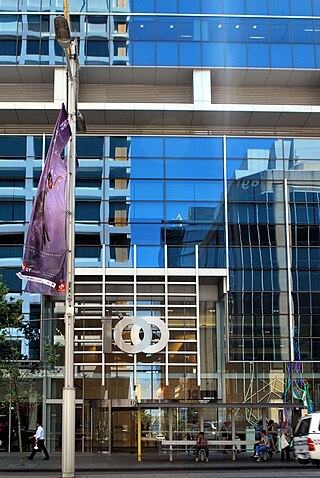
Canterbury Television was an independent television station broadcasting in Canterbury, New Zealand.

Bendix Hallenstein was a German-born Jewish merchant, statesman, and manufacturer from Dunedin, New Zealand. He is best known for founding the retail clothing store Hallensteins, which still bears his name, and is now part of the Hallensteins Glassons group. He also founded the D.I.C. department store in Dunedin in 1884.

Ao Tawhiti or Ao Tawhiti Unlimited Discovery is a state area school in Christchurch, New Zealand. The school is one of eleven schools running under the "Designated Special Character" criteria of the Education Act 1989.

The D.I.C. was a New Zealand department store chain, founded in Dunedin by Bendix Hallenstein in 1884.

100 St Georges Terrace is a 24-storey skyscraper located at 100 St Georges Terrace in Perth, Western Australia.

Christchurch Central City or Christchurch City Centre is the geographical centre and the heart of Christchurch, New Zealand. It is defined as the area within the Four Avenues and thus includes the densely built up central city, some less dense surrounding areas of residential, educational and industrial usage, and green space including Hagley Park, the Christchurch Botanic Gardens and the Barbadoes Street Cemetery.

The Hotel Grand Chancellor was a major four-star hotel in the centre of Christchurch in New Zealand, one of eleven Hotel Grand Chancellor establishments across Australia and New Zealand. The hotel was located at 161 Cashel Street, close to the city's City Mall central shopping precinct.

The CTV Building was the headquarters of Canterbury Television and other companies. Located on the corner of Cashel and Madras Streets in Christchurch Central City, New Zealand. It became one of the symbols of the February 2011 Christchurch earthquake after 115 people lost their lives when the building collapsed during the disaster; the deaths made up about 60% of the earthquake's total fatalities.

Aidanfield is a suburb in the south-west of Christchurch, New Zealand, about 8 kilometres (5.0 mi) from the city centre. The land, which had been owned by the Good Shepherd Sisters since 1886, now incorporates the Mount Magdala Institute and the St John of God Chapel, which has a Category I heritage listing by the New Zealand Historic Places Trust. The first residents moved into the suburb in 2002. The developer caused controversy in 2007–2008 by applying to have a group of farm buildings demolished to allow for further subdivision. Christchurch City Council was widely criticised for approving the demolition despite the buildings having had a heritage listing in the Christchurch City Plan.

City Mall is the main pedestrian mall in the central city of Christchurch, New Zealand, comprising two sections of Cashel Street plus the Bridge of Remembrance and one section of High Street. It is also known colloquially as Cashel Mall. The Bridge of Remembrance was pedestrianised in 1976. The main mall was closed to traffic on 11 January 1982 and formally reopened as a pedestrian mall on 7 August, but it was not until 1992 that the entire mall was paved. The mall was redeveloped between 2006 and 2009, and track was installed for an expansion of the heritage tram network.

J Ballantyne and Company Ltd, trading as Ballantynes is a Christchurch, New Zealand–based department store operator. Established in 1854, it is New Zealand's oldest department store. Ballantynes is also a member of the Intercontinental Group of Department Stores. Alongside their flagship store in Christchurch Central City, stores also operate in Timaru and Invercargill.

TheTrinity Church or Trinity Congregational Church designed by Benjamin Mountfort, later called the State Trinity Centre, is a Category I heritage building listed with Heritage New Zealand. Damaged in the 2010 Canterbury earthquake and red-stickered after the February 2011 Christchurch earthquake, the building was threatened with demolition like most other central city heritage buildings. In June 2012, it was announced that the building would be saved, repaired and earthquake strengthened. The building, post its church status, has housed some commercial operations, including the State Trinity Centre; 'The Octagon' (2006–2010); and later, following earthquake repairs, a business called 'The Church Brew Pub' (2023–present).

The Westpac Canterbury Centre was a landmark tower on the corner of High Street and Cashel Street in the center of Christchurch, New Zealand. In the early 2010s, it was considered the 9th tallest building in Christchurch, standing at 55 metres tall with 13-storeys and a basement level.

The Hornby Clocktower was an iconic Christchurch building, situated in the suburb of Hornby on New Zealand State Highway 1. It marked the southern entrance to Christchurch for over 50 years.

Hallensteins Glassons is a New Zealand fashion company based in Auckland, with stores in New Zealand and Australia.

Container Mall was a temporary mall built from shipping containers in Christchurch Central City, New Zealand. It was a response to the 22 February 2011 Christchurch earthquake, which destroyed most buildings in City Mall, and resulted in the central city being cordoned off from public access while buildings were being demolished. Initially considered a short-term response to the lack of permanent buildings, Re:START was popular with locals and tourists alike and remained open for business until January 2018.

Kiwi Property Group is one of New Zealand's largest NZX-listed property companies and the owner, and manager of a range of mixed-use, office, retail and build-to-rent assets including Sylvia Park, The Base, the Vero Centre and Resido.
Retailing in New Zealand is an important sector in the economy of New Zealand, as a channel for a large proportion of household spending and international visitor spending.
Invercargill Central is a shopping centre located in the central business district of Invercargill, New Zealand. Stage one of the project opened on 14 July 2022.The BusSmart Hub is outside Invercargill Central. All stores on the ground floor are open.



















